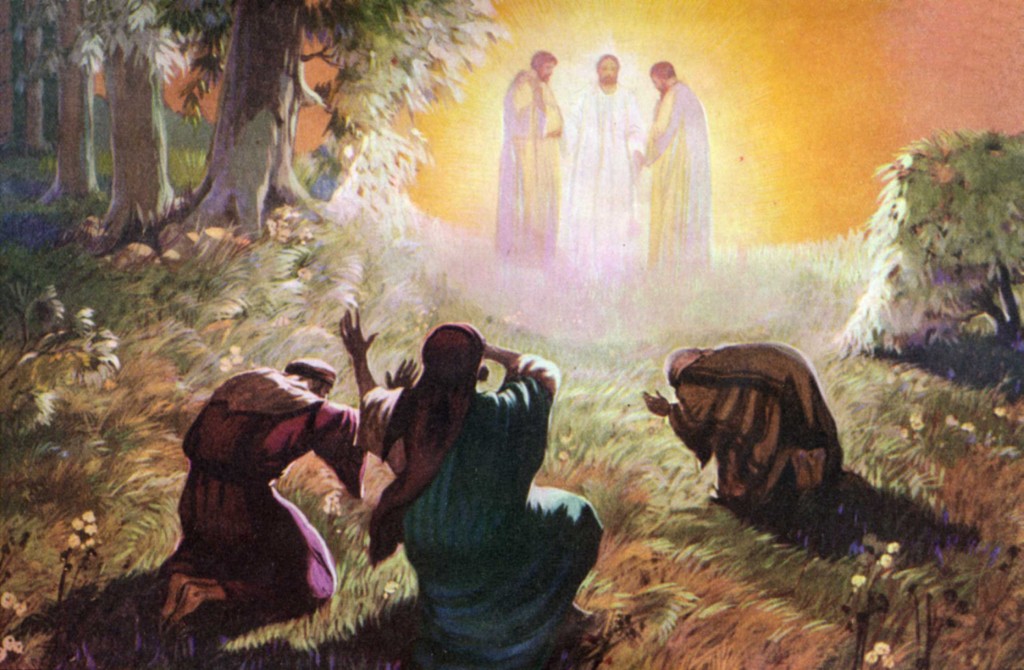The Beloved Son
Second Sunday of Lent
“And he was transfigured before them, and his clothes became dazzling white.” Mark 9:2-3

Today’s first reading, known as “the Binding of Isaac,” refers to the way Isaac is bound and laid upon the wood of the altar of sacrifice. God directs Abraham to offer his son in sacrifice, killing the beloved son that had been a special gift to him and Sarah in their old age. How could God ask Abraham to do such a thing? Abraham offers no resistance, but in preparing for the sacrifice, Abraham may have agreed with the psalmist that he was “greatly afflicted.” Saint Paul’s letter to the Romans refers to Jesus as God’s beloved Son, which is also how God identifies Jesus to Peter, James, and John at the Transfiguration. Afterward, Jesus tells those disciples not to mention the event to anyone until after his resurrection from the dead. The event, together with Jesus’ comments, leaves the disciples thoroughly confused.
How Could God Ask Abraham to Do That?
Through the centuries, Christians and Jews alike have found the Binding of Isaac one of the most difficult passages in the Bible. Even though God intervenes to save Isaac, the whole episode strikes some readers as cruel. However, Abraham, the ultimate man of faith, raises no objection, offers no resistance as he simply goes about preparing for the trip and the sacrifice.
Today’s other readings might help us see that text differently. In Mark’s description of the Transfiguration, Jesus’ clothes become white and shining, and Moses and Elijah appear with him. Moses was the great liberator and lawgiver who led the Jews out of bondage in Egypt and into the wildemess, forming them into the people of Israel by giving them the Law he received from God. Elijah was among Israel’s greatest prophets, so close to God that, at the end of his life, he was taken up into heaven by a fiery chariot. Together, Moses and Elijah represent the Law and the Prophets,
the ultimate authority for the Jews in the conduct of their daily lives.
Love and Generosity
The Law, the Prophets—and Jesus. For Paul, Jesus is someone quite different from the other two. The reading from his letter to the Romans is short, but rich in meaning. When Paul declares that God “did not spare his own Son,” and when God praises Abraham “who did not withhold from me your own beloved son,” it is the same Greek word for “spare” and “withhold.” God’s voice at the Transfiguration identifies Jesus as his “beloved Son”—the same way God refers to Isaac as Abraham’s beloved son. Ultimately, God spares Isaac but not his own Son, whom he “handed over for us.” Even if we are disturbed that God tested Abraham like this, Paul says we should be overwhelmingly grateful that God did for us what, in the end, he did not require of Abraham. Jesus, God’s Son “handed over to us” in love and generosity, is already a sacrificial gift, signifying that God wants to give us “everything else along with him.”
Reading of the Week
Monday: Dn 9:4b-10; Ps 79:8, 9, 11, 13; Lk 6:36-38
Tuesday: Is 1:10, 16-20; Ps 50:8-9, 16bc-17, 21, 23; Mt 23:1-12
Wednesday: Jer 18:18-20; Ps 31:5-6, 14-16; Mt 20:17-28
Thursday: Jer 17:5-10; Ps 1:1-4, 6; Lk 16:19-31
Friday: Gn 37:3-4, 12-13a, 17b-28a; Ps 105:16-21; Mt 21:33-43, 45-46
Saturday: Mi 7:14-15, 18-20; Ps 103:1-4, 9-12; Lk 15:1-3, 11-32
Sunday: Ex 20:1-17 [1-3, 7-8, 12-17]; Ps 19:8-11; 1 Cor 1:22-25; Jn 2:13-25
Alternate readings (Year A): Ex 17:3-7; Ps 95:1-2, 6-9; Rom 5:1-2, 5-8; Jn 4:5-42 [5-15, 19b-26, 39a, 40-42]
Saints & Special Observances
Sunday: Second Sunday of Lent; Penitential Rite for Candidates for Full Communion
Wednesday: St. Katharine Drexel
Thursday: St. Casimir
Friday: First Friday; World Day of Prayer; Abstinence
Saturday: First Saturday
